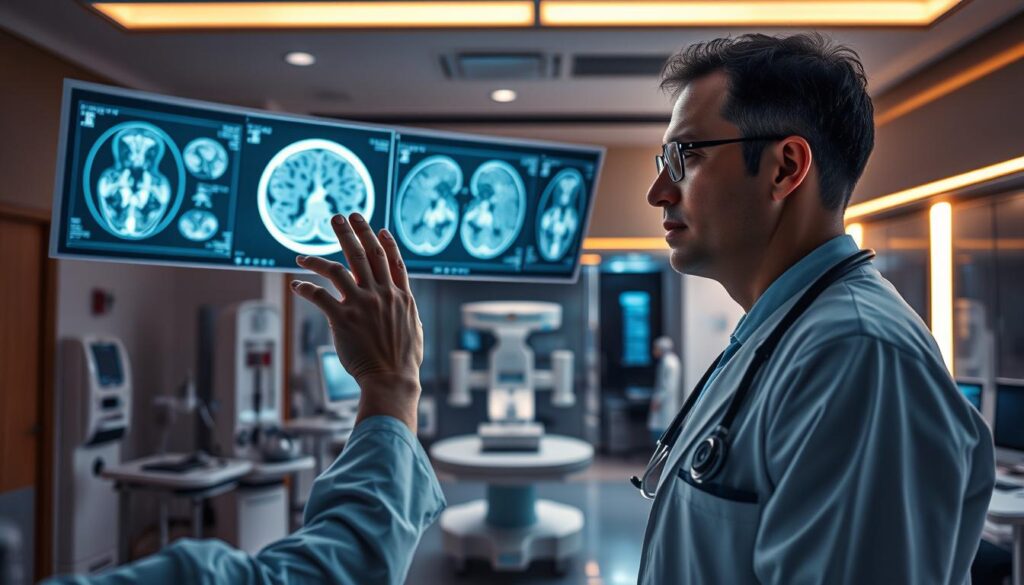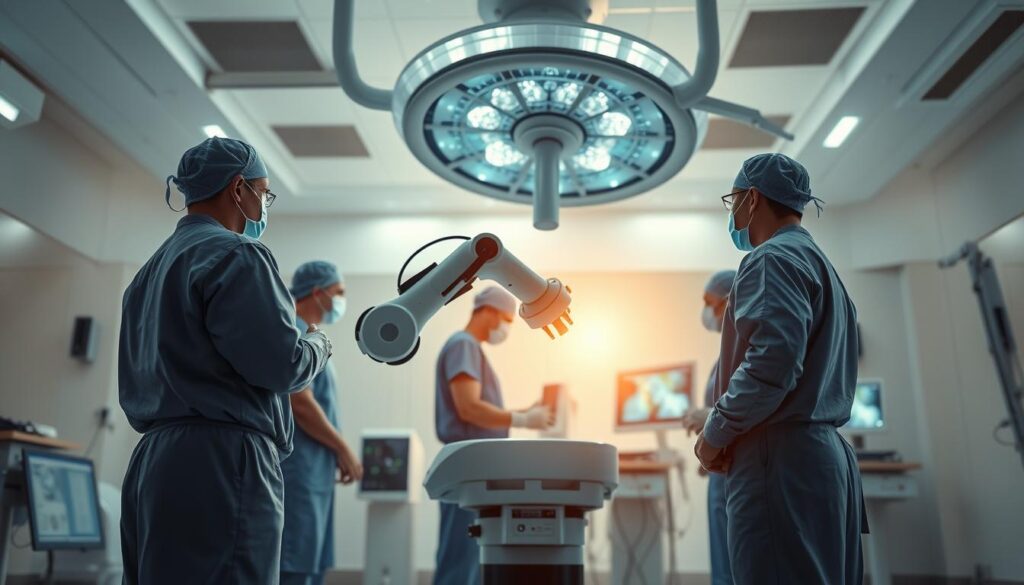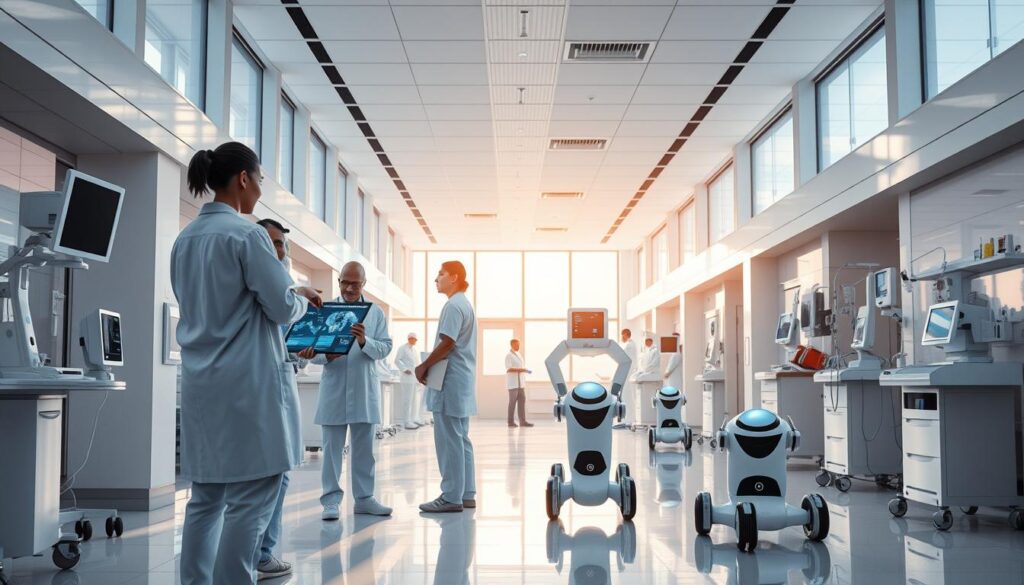The National Health Service (NHS) is using artificial intelligence to change how we care for patients. It’s introducing AI diagnostics and robotic surgery. These new technologies aim to make care more accurate, cut costs, and speed up treatments.

You’re seeing a big change in healthcare with healthtech innovations. For example, AI helps predict who might need emergency services often. This lets staff give better care sooner.
Key Takeaways
- The NHS is utilising AI to enhance patient care.
- AI diagnostics and robotic surgery are improving treatment accuracy.
- Healthtech innovations are reducing healthcare costs.
- Early intervention is being facilitated through predictive analytics.
- Patient outcomes are being improved through timely and appropriate care.
The Current State of AI in UK Healthcare
The UK’s healthcare system is changing fast with the help of Artificial Intelligence (AI). AI is making a big difference in how we care for patients. It’s shaping the future of healthcare.
NHS Digital Transformation Initiatives
The NHS is leading the way in digital change. They’re using AI to make patient care better and work more efficiently. For example, they’ve introduced High Intensity Use (HIU) services to over 125 emergency departments in England.
The NHSX AI Lab and Its Impact
The NHSX AI Lab is a key player in innovation. It focuses on creating and using AI solutions across the NHS. This effort is vital for testing and improving AI technologies to meet healthcare needs.
Government Funding and Support
Government funding is helping AI grow in healthcare. Big investments have been made to help develop and use AI in clinical settings.
Key Technologies Being Adopted
UK hospitals are adopting important technologies, like AI with Electronic Health Records (EHRs). This helps healthcare providers use patient data better.
AI Integration with Electronic Health Records
AI with EHRs is changing patient care. It lets healthcare providers make better decisions. This integration boosts diagnostic accuracy and tailors treatment plans.
Measuring Implementation Success
It’s important to measure how well AI works. Key performance indicators (KPIs) help us see its impact on patient care and efficiency.
| Technology | Application | Benefits |
| AI Integration with EHRs | Enhanced patient data management | Improved diagnostic accuracy, personalized treatment plans |
| NHSX AI Lab | Development and scaling of AI solutions | Innovative AI technologies, improved patient care |
| Government Funding | Support for AI adoption | Accelerated AI integration, improved healthcare delivery |
AI in UK Hospitals: How Technology Is Transforming Patient Care
The use of AI in UK hospitals is changing patient care for the better. It makes care more tailored and efficient. AI is leading this change in healthcare technology.
The Evolution of Healthcare Technology in the NHS
The NHS has seen big changes in technology over time. It moved from old paper records to modern AI tools. This change has greatly improved care and made things run smoother.
From Paper Records to AI Assistants
Switching to digital records has made managing data easier. Now, doctors can quickly find patient info. AI assistants have made things even better, letting staff focus on important tasks.
Milestones in UK Healthcare Technology Adoption
Important steps in UK healthcare tech include starting electronic health records and using AI in diagnosis. These steps have led to better patient results and more efficient services.
| Technology | Impact on Patient Care | Benefits |
| Electronic Health Records | Improved data accessibility and accuracy | Enhanced patient care and reduced administrative burdens |
| AI Assistants | Streamlined clinical workflows and decision support | Increased efficiency and better patient outcomes |
| AI-driven Diagnostics | Early disease detection and prevention | Improved diagnostic accuracy and reduced waiting times |
Impact on Patient Outcomes and Experience
AI in healthcare has greatly changed patient results and experiences. It has cut down waiting times and made diagnoses more accurate. This has made care better overall.
Reduced Waiting Times and Improved Accuracy
AI tools help doctors diagnose faster and more accurately. This means patients wait less and get help sooner. It leads to better health results.
Patient Perspectives on AI-Enhanced Care
Patients like the care they get with AI. They say it’s more personal and efficient. As AI gets better, patients will likely be even happier.
AI-Powered Diagnostics and Imaging
The use of AI in diagnostics is changing healthcare in UK hospitals. It’s making a big difference in how doctors diagnose patients. This is thanks to AI-powered diagnostics and imaging.

Machine Learning in Radiology and Pathology
Machine learning is being used more in radiology and pathology. AI in UK hospitals helps analyse medical images. It spots patterns that humans might miss.
AI for X-ray and MRI Analysis
AI helps doctors quickly and accurately diagnose with X-rays and MRIs. This is very helpful in emergencies when time is of the essence.
Pathology Automation and Digital Slides
AI is also changing pathology. Digital slides are analysed with machine learning. This makes diagnoses faster and more accurate.
AI for Early Disease Detection and Prevention
Machine learning in healthcare helps detect diseases early. AI looks at big datasets to find patterns of disease.
Cancer Screening Enhancements
AI is improving cancer screening. It helps find cancer early when it’s easier to treat. This is a big healthtech innovation that saves lives.
Cardiovascular Risk Assessment
AI algorithms assess cardiovascular risk. They help find patients at high risk of heart disease. This leads to early prevention and treatment.
| Diagnostic Area | AI Application | Benefit |
| Radiology | Image Analysis | Improved Accuracy |
| Pathology | Digital Slide Analysis | Enhanced Speed and Accuracy |
| Cancer Screening | Early Detection | Better Patient Outcomes |
Case Study: AI Diagnostics in NHS Trusts
Several NHS trusts are using AI diagnostics. Here are a couple of examples.
University College London Hospitals’ AI Initiatives
University College London Hospitals use AI for medical image analysis. This improves diagnostic accuracy and patient care.
Oxford University Hospitals’ Diagnostic Innovations
Oxford University Hospitals use AI to improve diagnostics, mainly in pathology and radiology. This leads to better patient outcomes.
Robotic Surgery and AI-Assisted Procedures
Robotic surgery is changing UK hospitals for the better. It brings more precision and better results for patients. With AI joining robotic systems, surgeries are getting even better.
Current Robotic Systems in UK Hospitals
UK’s top hospitals are using the latest robotic systems. They have the Da Vinci Surgical System and new tech coming in.
Da Vinci Surgical System Implementation
The Da Vinci System is being used more in UK hospitals. It gives surgeons better control and precision. This means they can do complex surgeries with less harm to the patient.
Emerging Robotic Technologies
New robotic tech is also coming to UK hospitals. These systems will make surgeries even better and let doctors do more.
Benefits for Surgeons and Patients
Robotic surgery and AI help both doctors and patients. It means better results and faster recovery. Doctors also get to improve their skills.
Enhanced Precision and Reduced Recovery Time
Robotic surgery is more precise and less invasive. This means less damage and quicker healing for patients.
Training and Skill Development for Surgeons
Doctors get special training for robotic surgery. This makes sure they use the tech well. It’s key for the best results.
Success Stories from Leading UK Medical Centres
UK’s top hospitals are seeing great results with robotic surgery. The Royal Marsden Hospital and Guy’s and St Thomas’ NHS Foundation Trust are leading the way.
Royal Marsden Hospital’s Robotic Surgery Programme
The Royal Marsden Hospital’s programme is a big success. They have great results and faster healing. It shows how robotic surgery can help with cancer care.
Guy’s and St Thomas’ NHS Foundation Trust Achievements
Guy’s and St Thomas’ NHS Foundation Trust is also doing well. They have better surgery results and happier patients. It shows the value of robotic tech.

Economic Impact and Cost Efficiency
The NHS leads in healthtech innovations, making AI-driven healthcare solutions key. It’s vital to look at both the initial costs and long-term savings. This is true when we talk about AI in UK hospitals.
Initial Investment vs. Long-term Savings
Starting AI in healthcare needs a big upfront investment. This includes costs for technology, training, and setting up new systems. But, these costs can lead to big savings over time.
Cost Analysis of AI Implementation
AI solutions come with various costs. These include the price of hardware, software, and training staff. It’s important to do a detailed cost analysis to see the financial impact of AI.
Return on Investment for NHS Trusts
NHS trusts can see a big return on their AI investment. They save money and improve patient care. For example, AI has helped cut down on frequent hospital visits by more than half in some places.
Reducing Treatment Costs and Hospital Stays
AI can make treatment cheaper and hospital stays shorter. It does this by making diagnoses more accurate and making patient care smoother.
Efficiency Gains in Patient Throughput
AI helps patients move through the system faster. It does this by better using resources and making clinical workflows more efficient. This leads to better care delivery.
Preventing Costly Complications and Readmissions
AI helps catch diseases early and prevent costly problems. This reduces the need for readmissions, saving money.
The benefits of AI in UK hospitals are clear. They range from the initial investment to long-term savings. As healthcare changes, understanding these benefits is key for NHS trusts and providers.

- AI implementation can lead to significant long-term savings.
- Reduced operational costs contribute to return on investment.
- Improved patient outcomes enhance overall healthcare efficiency.
AI for Hospital Administration and Resource Management
UK hospitals are using AI to make their admin work better and use resources wisely. This is key to better patient care and smoother operations.
Predictive Analytics for Patient Flow and Bed Management
Predictive analytics helps manage patient flow and bed use. AI looks at past data and current info to forecast patient numbers. This helps plan bed use better.
Reducing A&E Overcrowding
AI’s predictive analytics cuts down A&E crowding. It forecasts patient numbers to help manage flow better.
Optimising Hospital Admissions and Discharges
AI optimises admissions and discharges. It predicts when patients are ready to leave and streamlines the admission process. This cuts down waiting times.
AI-Optimised Staffing and Resource Allocation
AI is used for better staffing and resource use. It looks at workload and staff schedules to make rosters more efficient.
Intelligent Scheduling Systems
Intelligent scheduling systems use AI to make the best staff rosters. This ensures the right staff are there when needed.
Supply Chain and Inventory Management
AI helps manage hospital supplies and inventory better. It cuts down waste and makes sure essential items are always on hand.
| Area of Improvement | AI Application | Benefit |
| Patient Flow and Bed Management | Predictive Analytics | Reduced A&E Overcrowding |
| Staffing and Resource Allocation | Intelligent Scheduling | Optimised Staff Rosters |
| Supply Chain and Inventory | AI-driven Management | Reduced Waste and Costs |
Virtual Care and AI-Powered Remote Monitoring
Technology is changing how we care for patients in the NHS. Virtual care and remote monitoring are key parts of this change. They make healthcare in UK hospitals better and more focused on the patient.
Telehealth Solutions in the NHS
The NHS is using telehealth solutions more and more. These include virtual consultations and platforms for remote patient monitoring. They make it easier for patients to get the care they need.
Virtual Consultations and AI Triage
Virtual consultations let patients get medical advice from home. AI systems help sort out who needs care first. This means urgent cases get seen quickly.
Remote Patient Monitoring Platforms
These platforms let doctors keep an eye on patients’ health in real-time. It helps catch problems early. This can stop hospital stays and improve health outcomes.
AI Wearables and Home Monitoring Systems
AI wearables and home systems are key for managing long-term conditions and caring for the elderly. They monitor health continuously. This gives doctors valuable insights.
Chronic Disease Management Applications
AI wearables are great for managing diseases like diabetes and heart failure. They let doctors keep an eye on patients’ health in real-time. This leads to better care and outcomes.
Elderly Care and Independent Living Technologies
Technologies for elderly care help older adults live on their own safely. They include systems for detecting falls and reminders for medication. This improves their quality of life.
Virtual wards are also changing healthcare. They aim to cut down on long outpatient appointments and hospital admissions. Early reports show they’re making care better and saving money.
“The integration of virtual care and AI-powered remote monitoring is transforming patient care in the UK, making it more accessible and efficient.”
| Technology | Application | Benefit |
| Virtual Consultations | Remote Medical Advice | Increased Accessibility |
| Remote Patient Monitoring | Real-time Health Tracking | Early Intervention |
| AI Wearables | Chronic Disease Management | Improved Patient Outcomes |
Challenges and Ethical Considerations
AI in UK hospitals is changing healthcare, but it brings challenges and ethical questions. It’s key to look at the hurdles of adopting these new technologies.
Data Privacy and Security Concerns
Keeping patient data safe is a big deal in AI healthcare. You must think about the dangers of handling sensitive patient info.
GDPR Compliance in AI Healthcare Applications
AI healthcare apps must follow GDPR to protect patient data. It’s not just a rule; it’s about keeping patient trust.
Cybersecurity Measures for Patient Data
Strong cybersecurity is needed to safeguard patient data. Use top-notch security and keep systems updated to fight off threats.
Ensuring Equitable Access to AI Healthcare
AI healthcare must be available to all, not just some. You need to think about how to make sure everyone has access, even in remote areas.
Addressing Regional Disparities in Technology Access
Not everyone has the same access to technology, which can widen health gaps. Invest in making AI healthcare available everywhere.
Preventing Algorithmic Bias in Healthcare AI
AI bias can mean unfair treatment in healthcare. Make sure AI systems are fair and unbiased to ensure equal care for all.
Balancing Human Touch with Technological Efficiency
AI healthcare has many benefits, but we must not forget the human side. Find a way to keep the doctor-patient bond strong, even with more tech.
Maintaining the Doctor-Patient Relationship
The bond between doctors and patients is vital. Use AI to help, not replace, human interaction in healthcare.
Healthcare Professional Perspectives on AI Integration
Doctors and nurses have unique views on AI in healthcare. Listen to their experiences to make sure AI solutions work for everyone.
Conclusion
Artificial intelligence is changing patient care in UK hospitals. It’s used for diagnostics, robotic surgery, and virtual care. This digital change makes care more accurate, cheaper, and faster, improving patient experiences.
The NHS is set to see more AI benefits. This will help improve patient results, make clinical work smoother, and ease the workload for healthcare staff. AI is changing how care is given, focusing more on the patient.
UK hospitals are moving towards a future where AI is key in patient care. As these technologies get better, they will make healthcare more efficient, effective, and caring.
FAQ
How is AI being used in UK hospitals to improve patient care?
AI is making a big difference in healthcare. It helps with things like diagnosing diseases and performing surgeries. The NHS is using AI to make care better and faster.
What is the role of the NHSX AI Lab in UK healthcare?
The NHSX AI Lab is key in bringing AI to healthcare. It works on AI solutions for better diagnostics and managing resources. This aims to make healthcare services more efficient and effective.
How is AI being used in diagnostics and imaging?
AI is improving diagnostics and imaging. It uses machine learning to look at medical images and spot diseases early. It also helps in pathology by examining tissue samples.
What are the benefits of robotic surgery and AI-assisted procedures?
Robotic surgery and AI-assisted procedures are very beneficial. They offer better precision and shorter recovery times. These technologies are used in many surgical areas, like urology and gynaecology.
How can AI help reduce treatment costs and hospital stays?
AI can make healthcare more efficient. It streamlines workflows and helps in early intervention. AI analytics can also spot high-risk patients, reducing hospital admissions.
What are the challenges associated with implementing AI in healthcare?
There are challenges with AI in healthcare. These include data privacy and ensuring everyone has access. Balancing technology with human touch is also important.
How is AI being used in hospital administration and resource management?
AI is being used to improve hospital management. It helps with patient flow and staff allocation. This reduces waiting times and improves patient satisfaction.
What is the future of AI in UK healthcare?
The future of AI in healthcare looks bright. Advances in AI technology and better data will shape it. AI will likely transform patient care and healthcare systems.



